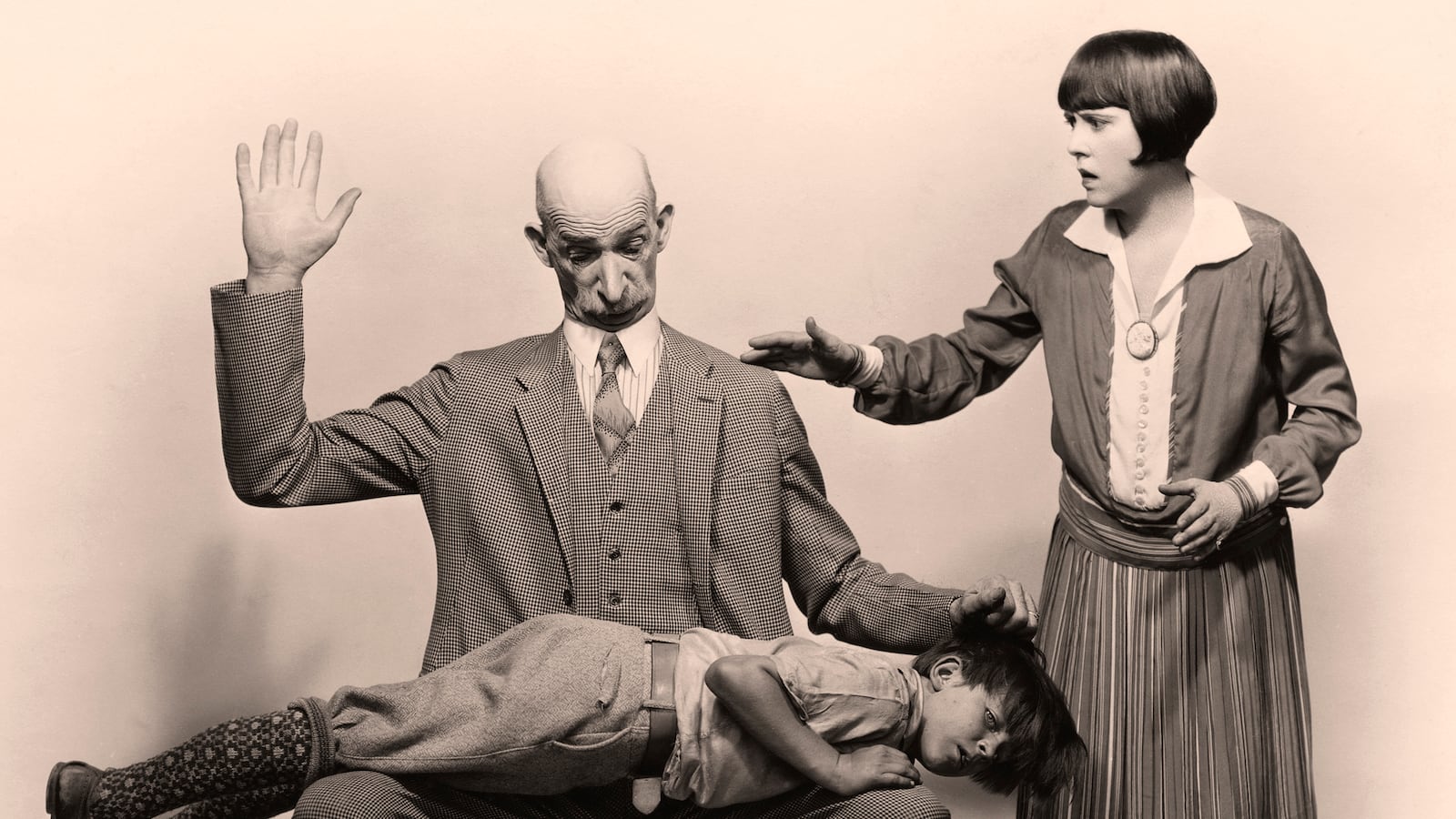I wish I could say it was surprising to learn that Adrian Peterson, his lawyer, and his friends are all defending Peterson from allegations of child abuse by saying that Peterson’s choice to beat his 4-year-old son with a stick was nothing but an expression of love. Beating children this way can leave scars, both physical and mental, but the practice continues—and continues to be treated by many as normal—in no small part because there’s an organized, conservative Christian movement that continues to promote corporal punishment and even argues that attempts to stymie the practice are an assault on their religion.
Like Peterson, I grew up in rural Texas and can attest that yes, it’s more common than not for parents to beat their children with sticks, belts, and various kitchen implements, all in the name of “love.” (I personally was never hit this way, but my family was the exception, not the rule.) It’s not just in Texas, either, as 67 percent of parents admit to spanking their children. In fact, 19 states, including Texas, still allow corporal punishment in schools.
Most of the people who support spanking draw a distinction between “corporal punishment” and “child abuse,” but as the Peterson case shows, where people draw that line varies wildly. To make the situation worse, the Christian right has, for decades now, both heralded corporal punishment as the best way to discipline children and has resisted efforts to strengthen protections for children on the grounds that these violate “parental rights.”
This is why the United States, along with Somalia, is the only country in the world not to have ratified the United Nations Convention on the Rights of the Child, a document that outlines U.N. expectations for how governments are to handle the rights of children. The reason for the reluctance is simple: The Christian right won’t allow the Senate to ratify the Convention. There are many reasons for this, but a big one is fear that the Convention would force the government to outlaw spanking.
It is true that the Convention, according to UNICEF, gives children “the right to be protected from being hurt and mistreated, physically or mentally” and that “any form of discipline involving violence is unacceptable.” The Convention doesn’t go so far as to explicitly call on governments to outlaw spanking, but the wording does strongly advise against all hitting of children in favor of other forms of discipline.
“Parents would no longer be able to administer reasonable spankings to their children” if the U.S. ratified the Conventions, argues the Christian right website Parental Rights, the primary resource fighting efforts to protect the rights of children.
The problem with “reasonable” is there’s no good definition of what counts as reasonable. It’s a phrase designed to call to mind a soft and painless swat on a toddler’s butt to get their attention, but in reality, what Christian conservatives define as “reasonable” is intended to cause pain and injury to children. Focus on the Family argues that any kind of spanking that does more than “sting” is too much, but even their supposedly “reasonable” approach allows for parents to “use a wooden spoon or some other appropriately sized paddle” and that it “ought to hurt” and should produce “a few tears and sniffles.”
The worst part is that Focus on the Family is restrained compared to other Christian conservative child-rearing advice. A more controversial but still popular book on child-rearing, To Train Up A Child by Michael and Debi Pearl, recommends that parents start spanking at 6 months old and use belts and plumbing tubes to beat children with. Unsurprisingly, considering the harsh attitude toward children on display, this book has turned up in a number of homes of parents accused of abusing children to death.
Christian conservatives defend the practice of spanking children, even with weapons, by saying that parents are not supposed to do so in anger. “You want to be calm, in control, and focused,” writes Chip Ingram of Focus on the Family, and that a parent who embraces corporal punishment “is not an angry, insensitive person with a big club and a vicious agenda.” This echoes a common refrain from parents to justify spanking, that they don’t do it in anger and they reserve it for serious infractions that require a lot of time and processing so the child doesn’t do it again.
Unfortunately, parents are overestimating their own abilities to keep it in check. Researchers at Southern Methodist University strapped audio recorders onto the arms of 33 mothers to see if and when they used spanking, and found that instead of retreating to a quiet space to calmly administer a spanking, mothers who spank are just hitting in anger and frustration. Kids got spanked for finger-sucking, messing with pages of a book, or getting out of a chair when they weren’t supposed to. Parents who spank say they do so around 18 times a year, but the SMU researchers found it was closer to 18 times a week.
“The recordings show that most parents responded either impulsively or emotionally, rather than being intentional with their discipline,” explained the lead researcher. This study was just of mothers who were smacking with their hands, but as the Peterson case shows, there’s reason to believe that parents who escalate to much more violent kinds of hitting are no more likely to hold back or temper their anger.
To make it all worse, there’s no reason to think spanking works. In the SMU study it was found that children lasted about 10 minutes after a smack before they started misbehaving again. Farther-reaching research shows that not only are spanked children not better behaved, they’re worse off for it, and that spanking is associated with more criminal and antisocial behavior as well as slower cognitive development.
Spanking doesn’t work to improve behavior. It’s hard for parents to regulate their spanking, so that it all too frequently turns into outright abuse. The line between “reasonable” spanking and abuse is hazy for even the best-intentioned parent. So why does the practice persist and why does the Christian right melt down at the mere hint of a suggestion that anyone would make it legally more difficult to beat your children?
A major part of the problem is that spanking your child is a part of many people’s identities about what it is to be a Christian, which is why so many conservative Christians love to claim “spare the rod and spoil the child.” Because of this, attempts to fix the problem and discourage spanking and even outright abuse are often regarded as attacks on their identities as Christians. Peterson’s own public statement, where he indicates that he was disciplined like this as a child and “the way my parents disciplined me has a great deal to do with the success I enjoyed as a man.” People feel, when you criticize spanking, that you are criticizing their families, their upbringing, and even their faith.
But it doesn’t have to be that way. As Peterson also said in his public statement, “There are other alternative ways of disciplining a child that may be more appropriate,” ways that don’t cause physical or mental harm, whether intended by the spanker or not. Christian conservatives have long argued that it’s totally possible to allow spanking while disallowing child abuse. Let’s hope this Adrian Peterson debacle shows that idea is much easier said than done.





